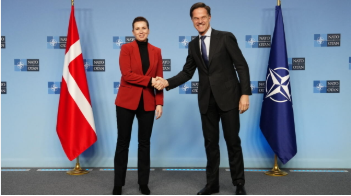Danish Prime Minister Claims European Support Against Trump’s Greenland Proposal
In 2019, former U.S. President Donald Trump sparked a major diplomatic controversy when he expressed interest in purchasing Greenland, an autonomous territory of Denmark. The proposed idea was met with widespread criticism both in Denmark and globally, including from European leaders. Denmark, a key NATO ally of the United States, quickly rebuffed the offer, emphasizing Greenland’s sovereignty and autonomy. Since then, the diplomatic row has continued to reverberate, with the Danish Prime Minister recently asserting that she has received European backing against Trump’s Greenland push. This article delves into the context of this situation, the reactions from European leaders, and the broader geopolitical implications of the dispute.
The Proposal: Trump’s Interest in Greenland
In August 2019, President Trump made international headlines when he suggested the United States might buy Greenland, calling it a “strategic” acquisition due to the territory’s location in the Arctic. His remarks were initially met with bewilderment by many, as Greenland is not a commercial property that can be sold. The territory, with a population of roughly 56,000, is part of the Kingdom of Denmark and has considerable autonomy, with control over most internal matters.
Despite its strategic importance in the context of Arctic geopolitics, where the U.S. and Russia are both vying for influence, Trump’s interest in acquiring Greenland appeared more as a business transaction than a diplomatic exchange. His administration emphasized the potential economic benefits of such a move, including the possibility of mining resources in Greenland’s vast, largely untapped reserves.
Denmark’s Rejection of the Proposal
Denmark was quick to reject Trump’s proposal. Prime Minister Mette Frederiksen called the idea “absurd” and emphasized that Greenland is not for sale. Greenland’s government also voiced strong opposition, stating that the proposal undermined their self-determination. The Danish government responded with an official rejection, affirming that Greenland’s future would be determined by its people, not external powers.
Greenland’s significance goes beyond its size or resources; it holds substantial geopolitical value due to its location. Situated between North America and Europe, it is strategically important for both military and environmental reasons, particularly as the Arctic ice melts, opening new shipping routes and potential energy reserves. However, despite its strategic importance, Greenland’s status remains tied to Denmark, and Denmark made it clear that this sovereignty issue would not be negotiated away.
European Backing for Denmark
Following Denmark’s firm stance, European leaders were quick to express support for Denmark and Greenland. The European Union, while not directly involved in the territorial question, reiterated its commitment to respect the sovereignty of its member states and territories. Several European leaders, including those from France, Germany, and Sweden, publicly sided with Denmark, emphasizing that the sale or transfer of Greenland’s territory was out of the question.
This show of European solidarity was important for Denmark, as it reinforced the message that Trump’s push was not only unacceptable but also isolated. European leaders were also quick to point out the broader implications of such a proposal, raising concerns about the future of international law and territorial integrity. The European Union, a bloc of nations with a strong commitment to diplomacy and respect for international borders, found Trump’s proposal troubling, viewing it as an overreach in U.S. foreign policy.
Geopolitical Implications of the Dispute
The Greenland incident was more than just a diplomatic dispute between the U.S. and Denmark. It was a window into the shifting power dynamics in the Arctic and the broader geopolitical landscape. As the Arctic region becomes increasingly important due to climate change and the opening of new shipping routes, global powers have been scrambling to assert influence over the region. Both Russia and China have expressed growing interest in the area, seeking access to resources and new trade routes. In this context, Trump’s interest in Greenland was seen by some as an attempt to secure U.S. dominance in the Arctic.
However, the proposal also highlighted the growing divide between the United States and its European allies. While the U.S. has often looked to assert its power through economic and military means, Europe has tended to take a more diplomatic approach to resolving international disputes. The Greenland proposal underscored the differences in how the two sides view territorial sovereignty, with Europe prioritizing respect for international borders and self-determination.
The Legacy of the Dispute
While Trump’s proposal was never seriously considered, the diplomatic tensions it caused had lasting effects on U.S.-European relations. The incident prompted renewed discussions about the future of the Arctic, climate change, and the role of global powers in shaping the region’s future. It also raised questions about the broader role of the U.S. in global affairs and its relationship with Europe.
For Denmark and Greenland, the dispute reinforced the importance of maintaining control over their own territory. It also demonstrated the solidarity that can arise between European nations when faced with a challenge to their sovereignty. The backing from European leaders was crucial in sending a strong message to the U.S. that territorial disputes would not be resolved through economic transactions, but rather through diplomacy and respect for established borders.
Conclusion
The controversy surrounding President Trump’s interest in Greenland remains a fascinating chapter in international diplomacy. While the proposal itself was unlikely to result in any significant change, it shed light on the complex and often contentious nature of international relations. The backing of Denmark by European leaders was a clear signal of unity in the face of external pressure and a reaffirmation of the principles of territorial integrity and self-determination. This episode serves as a reminder of the delicate balance of power in the Arctic region and the importance of maintaining strong diplomatic ties among nations in an increasingly interconnected world.


Leave a Comment